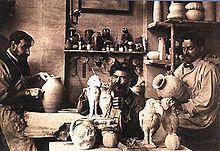- Martin Brothers
-
The Martin Brothers were pottery manufacturers in London who are considered to represent the transition from decorative Victorian ceramics to twentieth century studio pottery in England.
The four brothers (Wallace, Walter, Charles and Edwin) produced a distinctive type of stoneware pottery from the 1870s through to the First World War, with a little work being produced through to 1923 when their pottery closed. The Martinware Pottery (1873-1923) is a good example of a Victorian art pottery, and (of most relevance in these pages) the output included both illustrative and sculptural work. They were best known for their bird sculptures and bowls, vessels decorated with sea creatures, and tiles, fashioned in a whimsical but highly skillful style. [1]
The Pottery was started in Fulham in 1873 by Robert Wallace Martin (1843–1923), [2] who had trained as a sculptor. In 1877 the business was moved to Havelock Road, Southall, Middlesex, where it remained (and several of the brothers are now buried in the cemetery on this road). Walter Martin (1857-1912) became the firm's specialist on the wheel, Edwin Martin's (1860-1915) work included most of the fish and flower designs, and Charles Martin ran the shop. They worked mainly with a saltglaze stoneware, a high-temperature firing method where salt was thrown into the kiln, in order to fuse with the clay and give a surface which could be glassy or matt depending on the conditions of each firing. Whereas many stoneware glazes obscure the clay itself, the saltglaze method served to highlight the impressed and incised decoration on the surface of their pots. The colours included browns, greens, greys and blues, and this subdued palette is distinctive of Martinware.
Robert Wallace Martin, the eldest brother, had worked for a while for the architectural sculptor J. B. Phillips of Vauxhall Bridge Road, and later took drawing classes at the nearby Lambeth School of Art. Walter and Edwin Martin also studied there, and both worked for a time at the Royal Doulton Pottery, also in Lambeth.
Martinware pottery may be found in various ceramic collections. A wide range of their work may be seen in the Hull Grundy Collection at Pitzhanger Manor, Ealing. A small selection is on show in the Norwich Castle museum. It is nicely in context with much other ceramic work.
The chancel arch in Ayot St Peter’s (Hertfordshire, United Kingdom) is unique; it was the only commission by the Martin Brothers for a church.
References

This ceramic art and design-related article is a stub. You can help Wikipedia by expanding it.

